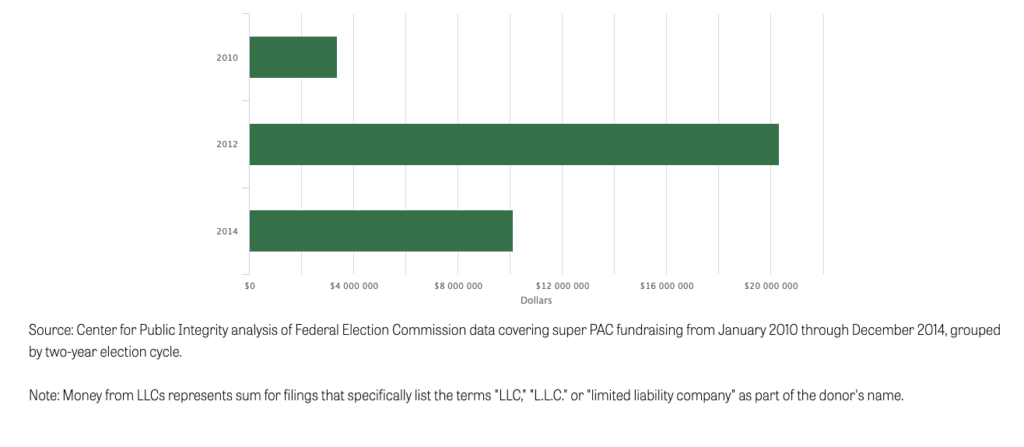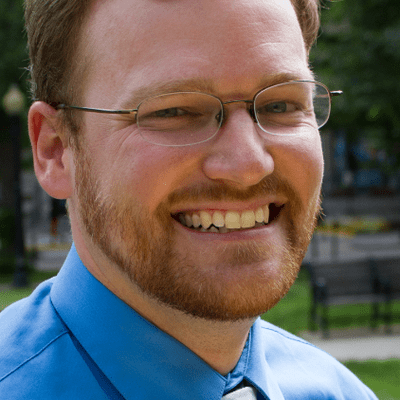This story was co-published with Slate.
Introduction
It was less than a month before the 2012 election when a spokesman for Black Men Vote, a political group backed by hip-hop musicians including Common and Pras Michel, publicly announced: “I want a $500,000 donor.”
Three days later, his wish was all but granted.
That’s when a cool $400,000 landed in the bank account of Black Men Vote, a super PAC whose goal was mobilizing young black men to support President Barack Obama’s re-election. Super PACs are political committees that can raise unlimited amounts of money to help elect or defeat political candidates.
The source of the money? An obscure limited liability company identified as “SPM Holdings LLC” with an address in Palm Beach Gardens, Florida.
By Election Day, SPM Holdings would double down and make an additional six-figure contribution, bringing its total financial support of Black Men Vote to $875,000.
It was one of the largest donations to a super PAC ever by a limited liability company, according to a Center for Public Integrity review of federal campaign finance records.
Moreover, the LLC money represented two-thirds of the $1.3 million Black Men Vote raised in 2012.
That’s a larger portion of money than any other top-tier super PAC has received from limited liability companies — business entities that can be used to shield the identities of the actual people making large political contributions.
Federal records would eventually show that Pras, a Grammy-winning rapper and founding member of the Fugees, provided $250,000 in seed money for the super PAC’s efforts and another $100,000 before Election Day.
“The best way we can make a change is empowering one another,” Pras told the Center for Public Integrity in a recent interview. “I put my money where my mouth was.”
But the donor (or donors) behind SPM Holdings would remain — until now — a mystery.
The allure of LLCs
Super PACs, which were created in the wake of the U.S. Supreme Court’s Citizens United v. Federal Election Commission decision and a related federal court case in 2010, are supposed to be transparent political committees, publicly disclosing who funds them.
However, limited liability companies such as SPM Holdings can serve as vehicles for mega-donors to contribute to the groups — many of which are aligned with specific political candidates — while hiding their identities from voters.
“This is an avenue that will appeal to people who want to spend money politically and not necessarily be disclosed,” said Elizabeth Kingsley, a Washington, D.C.-based attorney who specializes in campaign finance law.
That’s because some states, such as Delaware and Wyoming, don’t require LLCs to identify the living, breathing people who own or control them. Instead, they need to provide only the name of a “registered agent,” which is often a company that exists only to serve as the registered agents for LLCs.
“You don’t even have to have a human being as a member of certain LLCs,” said Ciara Torres-Spelliscy, a law professor at Stetson University College of Law. “It can get quite byzantine very quickly.”
The allure of using LLCs to influence politics could become even stronger if the Internal Revenue Service institutes proposed new rules that would require “social welfare” nonprofits organized under Section 501(c)(4) of the U.S. tax code to be less politically active. Today, hundreds of millions of dollars in largely untraceable “dark money” flow through such groups for political expenditures.
At least $33 million — and counting
LLCs are already playing politics. Collectively, they’ve pumped at least $33 million into super PACs since 2010, according to a Center for Public Integrity review of federal campaign finance data.
That’s only about 2 percent of all of the money that super PACs have raised, but it’s been concentrated in contributions to several of the nation’s most powerful super PACs. The amount of money may also be higher because super PACs do not always identify an LLC donor as a limited liability company in campaign finance filings.
Democratic-aligned Senate Majority PAC, for example, has received more than $3.7 million from LLCs since 2010, including $1.65 million last October from the Council for American Job Growth LLC, an offshoot of a pro-immigration reform group founded by Facebook CEO Mark Zuckerberg.
In a rare move, the Council for American Job Growth itself spent $720,000 last fall on ads boosting Democratic Sen. Jeanne Shaheen of New Hampshire, rather than donating it to an established political group.
It’s unclear who funds the Council for American Job Growth.
Meanwhile, two massive Republican super PACs — Restore Our Future and American Crossroads — have amassed more money from LLCs than any others, the Center for Public Integrity’s analysis indicates. In most cases the people behind the contributions have been identified, but not always.
Restore Our Future, the main super PAC that supported Republican 2012 presidential nominee Mitt Romney, raised more than $10 million from LLCs — more than any other super PAC.
Energy companies Oxbow Carbon LLC and Huron Carbon LLC — two LLCs connected to billionaire William Koch, the lesser-known brother of conservative bankrollers Charles and David Koch — ranked among Restore Our Future’s largest donors, giving $2.75 million and $1 million respectively.
Restore Our Future also received a $1 million contribution from a shadowy, Delaware-based outfit called W Spann LLC. That company’s gift made headlines after NBC News detailed how this LLC formed, made the seven-figure contribution and dissolved within a matter of months.
Within days of the story, campaign watchdogs filed complaints with the Federal Election Commission and Department of Justice accusing W Spann LLC of simply being a conduit for someone to make a political contribution — and for also failing to register as a political action committee.
Ed Conard, a former official at private equity firm Bain Capital who had close ties to Romney, ultimately came forward as the mystery man behind W Spann LLC. Conard insisted he acted legally. But he also asked Restore Our Future to amend its campaign finance report to name him, not his company, as the donor.
To this day, Paul S. Ryan, an attorney at the Campaign Legal Center — one of the watchdog groups that filed complaints against W Spann LLC — argues that Conard broke the law by using an LLC to “hide” his identity.
Limited liability companies, Ryan said, cannot be used to “simply launder funds.”
The complaints are still pending.

Delaware, where paper trails dead-end
Like W Spann LLC, SPM Holdings LLC — the entity that helped bankroll Black Men Vote — is also difficult to unpack.
First, state business registration records don’t show any company named “SPM Holdings LLC” in Florida, where federal election records say it’s located.
Florida real estate records, however, do show a company named “SPM 2012 Holdings LLC” at the same Florida address that the Black Men Vote super PAC listed for SPM Holdings LLC in its campaign finance filing.
SPM 2012 Holdings LLC is likewise not registered in Florida. Instead, it’s officially registered in Delaware, where records list only a registered agent: Dover, Delaware-based Registered Agent Solutions Inc., a for-profit company that boasts of being “an innovative leader in the registered agent and transactional service industry.”
An employee of Registered Agent Solutions Inc. said it was the company’s policy not to give out client information. “There is no public information that I can provide,” she added.
Back in Florida, a business and financial consulting firm called Cruden Bay Partners LLC also shares the same address as SPM 2012 Holdings LLC. But even some people there said they were unfamiliar with it.
One Cruden Bay employee told the Center for Public Integrity “there’s no SPM here” and said “you might have the wrong number” before hanging up the telephone.
Reached via email, Lawrence Rovin, a lawyer who owns Cruden Bay Partners, wrote: “I am not at liberty to provide you with any information regarding SPM 2012 Holdings, LLC.”
Who is SPM Holdings?
Black Men Vote ultimately spent nearly $850,000 during the fall of 2012 on radio ads in Virginia and Ohio that supported the president’s re-election. Obama handily carried black voters in both battleground states.
Exit polls showed that black voters made up a larger share of the vote in the Buckeye State than they had four years earlier, increasing from 11 percent of all voters in 2008 to 15 percent in 2012. In Virginia, one out of every five voters during both elections was black.
It’s hard to definitively say how large a role Black Men Vote played in either state, but officials with the super PAC say they were pleased with their efforts.
“We know that we were a part of the equation,” said Jeff Johnson, a former BET host and the spokesman for Black Men Vote who made the $500,000 fundraising appeal two years ago.

Pras, too, said he believes the group was successful. And as it turns out, he actually gave more money than the federal filings themselves indicated.
The former Fugees star confirmed that SPM Holdings LLC — which is officially called SPM 2012 Holdings LLC — was his, adding that it was “just a holding company to do my everyday business through.”
This acknowledgment means that Pras provided $1.2 million in total to Black Men Vote, or more than 90 percent of its receipts.
William Kirk, the founder and treasurer of Black Men Vote, said he was grateful for the resources provided by Pras and the super PAC’s other supporters.
“Hopefully people will see Black Men Vote as an example,” he said of the group, which effectively ceased operations after the 2012 election.
Kirk was talking about using a super PAC to reach a specific demographic, such as the 18-to-34-year-olds targeted by Black Men Vote. But others could draw a different lesson from the group as well: It’s a road map for how to opaquely fund a super PAC.
No consensus for new rules
While the major LLC donor behind Black Men Vote has now — more than two years after the 2012 election — voluntarily revealed his identity, federal law does not require this disclosure. And ideological divisions on the Federal Election Commission, the nation’s top campaign regulator, may sink any proposal that would try to do so.
Even as the Citizens United ruling has reshaped the nation’s political landscape, new rules for LLCs haven’t been discussed.
Individuals have long been allowed to use LLCs to make donations to federal candidates — but contribution records must show both the name of the LLC and the name of the person, or people, responsible for the money. That’s to ensure that individuals don’t exceed campaign contribution limits and that candidates don’t receive corporate money.
Neither of those regulatory rationales apply to the world of super PACs, as these political committees may accept contributions of unlimited size, including money from corporations. But activists in some states, such as New York, are currently pushing to change how contributions from LLCs to state politicians are treated.
The FEC’s three Republican commissioners, who are often at odds with their three Democratic-leaning counterparts, declined to comment for this story.
David Mason, a former Republican FEC chairman, said it’s “pointless” to create additional reporting requirements for LLCs that give money to super PACs because “anybody who didn’t want that information disclosed would simply do the exact same activity through a corporation.”
But at least two of the commission’s Democratic members don’t see it that way.
“It is another situation where we have a failure to require important disclosure that the public’s entitled to have,” said Ann Ravel, the Democrat who currently serves as the commission’s chairwoman.
Her sentiments were echoed by fellow Democratic FEC Commissioner Ellen Weintraub, who stressed that super PACs are supposed to be transparent.
“If you don’t know who’s behind it,” Weintraub said, “then you don’t know what you don’t know. Could be a foreign citizen. Could be a foreign government. Could be anybody.”
Read more in Money and Democracy
Money and Democracy
Meet the ‘dark money’ phantom
Ohio lawyer at the nexus of nonprofit network is conservatives’ secret weapon
Money and Democracy
Capitol Hill’s Uber caucus
Democrats and Republicans both voting for car booking company with their wallets




Join the conversation
Show Comments